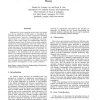5056 search results - page 59 / 1012 » Network Coding Theory |
142
click to vote
FORTE
2010
15 years 3 months ago
2010
Wireless sensor networks are typically ad-hoc networks of resource-constrained nodes; in particular, the nodes are limited in power resources. It can be difficult and costly to rep...
112
click to vote
HICSS
2006
IEEE
15 years 8 months ago
2006
IEEE
After more than a decade of research in information technology-enabled business process reengineering (BPR), no clear theory explains the link between information technology (IT) ...
120
click to vote
MDM
2009
Springer
15 years 8 months ago
2009
Springer
Mobile Ad-hoc NETworks (MANETs) are known to be vulnerable to a variety of attacks due to lack of central authority or fixed network infrastructure. Many security schemes have bee...
135
click to vote
WOWMOM
2006
ACM
15 years 8 months ago
2006
ACM
Motivated by recent surfacing viruses that can spread over the air interfaces, in this paper, we investigate the potential disastrous threat of node compromise spreading in wirele...
135
click to vote
FUIN
2008
15 years 25 days ago
2008
Causal relations are present in many application domains. Causal Probabilistic Logic (CP-logic) is a probabilistic modeling language that is especially designed to express such rel...

